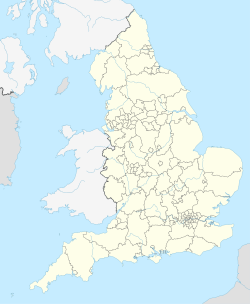 Modern statue of Constantine the Great outside York Minster | |
| Alternative name | Eburacum |
|---|---|
| Location | York, North Yorkshire, England |
| Region | Britannia |
| Coordinates | 53°57′42″N 01°04′50″W / 53.96167°N 1.08056°W |
| Type | Fortification and settlement |
| History | |
| Builder | Quintus Petillius Cerialis |
| Founded | 71 |
| Periods | Roman Imperial |
| Site notes | |
| Archaeologists | Leslie Peter Wenham |
 |
| Part of a series on the |
| Military of ancient Rome |
|---|
|
|
Eboracum (Classical Latin: [ɛbɔˈraːkũː]) was a fort and later a city in the Roman province of Britannia. In its prime it was the largest town in northern Britain and a provincial capital. The site remained occupied after the decline of the Western Roman Empire and ultimately developed into the present-day city of York, in North Yorkshire, England.
Two Roman emperors died in Eboracum: Septimius Severus in 211 AD, and Constantius Chlorus in 306 AD.
The first known recorded mention of Eboracum by name is dated c. 95–104 AD, and is an address containing the settlement's name, Eburaci, on a wooden stylus tablet from the Roman fortress of Vindolanda in what is now the modern [[Northumname="Hall">Hall 1996, p. 13</ref> During the Roman period, the name was written both Eboracum and Eburacum (in nominative form).[1]
The name Eboracum comes from the Common Brittonic *Eburākon, which means "yew tree place".<Hall 1996, p. 27; the wholly fictitious king Ebraucus (derived from the Old Welsh spelling of the place name, (Cair) Ebrauc), ruling in the days of biblical King David, was an invention of Geoffrey of Monmouth's Historia Regum Britanniae.</ref>[failed verification] The word for "yew" was *ebura in Proto-Celtic (cf. Old Irish ibar "yew-tree", Irish: iúr (older iobhar), Scottish Gaelic: iubhar, Welsh: efwr "alder buckthorn", Breton: evor "alder buckthorn"), combined with the proprietive suffix *-āko(n) "having" (cf. Welsh -og, Gaelic -ach)[2] meaning "yew tree place" (cf. efrog in Welsh, eabhrach/iubhrach in Irish Gaelic and eabhrach/iobhrach in Scottish Gaelic, by which names the city is known in those languages). The name was then Latinized by replacing the Celtic neuter nominative ending -on by its Latin equivalent -um, a common use noted also in Gaul and Lusitania (Ebora Liberalitas Julia). Various place names, such as Évry, Ivry, Ivrey, Ivory and Ivrac in France would all come from *eburacon / *eburiacon; for example: Ivry-la-Bataille (Eure, Ebriaco in 1023–1033), Ivry-le-Temple (Evriacum in 1199),[3] and Évry (Essonne, Everiaco in 1158).[4][2]
Peter Schrijver has instead counter-argued that "eburos did not mean yew tree" and that the derivation from Latin ebur (ivory) instead refers to boar's tusks.[5]
- ^ Hall 1996, p. 13
- ^ a b Xavier Delamarre, Dictionnaire de la langue gauloise, éditions errance 2003, p. 159.
- ^ Nègre 1990, p. 213
- ^ Nègre 1990, p. 212
- ^ Peter Schrijver (2015). "The meaning of Celtic *eburos". In G. Oudaer; G. Hily; H. le Bihan (eds.). Mélanges en l'honneur de Pierre-Yves Lambert. pp. 65–76.
